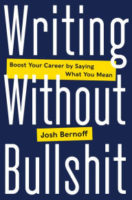 Writing Without Bullshit: Boost Your Career by Saying What You Mean
Writing Without Bullshit: Boost Your Career by Saying What You Mean
Josh Bernoff
HarperBusiness/An imprint of HarperCollins (September 2016)
The power of Lean thinking and writing
One of the greatest benefits of Lean principles is that they can help leaders in almost any organization make it more efficient and more productive as well as more profitable by eliminating or minimizing waste in production areas such as cycle time and first-pass yield. In fact, these principles can create almost unlimited opportunities at all levels and in all areas of the given enterprise to save hours and dollars.
Josh Bernoff offers both good news and bad news. First the bad news: “The tide of bullshit is rising.” I agree with him, conceding that I have contributed to that elevation, to that tsunami of linguistic dung. However, there is also good news: “The tide of bullshit is rising.” Especially now when the global marketplace seems more volatile, more uncertain, more complex, and more ambiguous than at any prior time that I can remember, being able to communicate without bullshit can be a decisive competitive advantage. A high level of literacy will certainly be conspicuous.
Bernoff applies Lean principles to internal and external organizational communications. He explains how to give an enema to what is said and how it is expressed. He explains to his reader why he wrote this book: “I want you to unlearn the bloated, jargon-laden style you’ve been steeped in so far and switch to an impactful, direct, clear, and engaging way of communicating.” Why? Because “the more noisy our environment gets — the more crap that’s out there — the more essential it is to respect the Iron Imperative [i.e. ‘Treat the reader’s time as more valuable than your own’]. Don’t waste your reader’s time. Boost your career by saying what you mean.”
Bernoff takes a very practical approach when presenting an abundance of information, insights, and counsel. His focus is almost always on explaining HOW TO
o Change his reader’s perspectives on high-impact communication
o Overcome fears of failure, rejection, misunderstanding, etc.
o Write briefly
o Front-load whatever needs to be said
o Replace and avoid jargon
o Think rigorously before writing clearly and concisely
o Plan with specific purpose
o Unleash creative energies
o Engage and remain in “flow”
o Embrace edits and especially re-edits
o Understand what “containers” are and how best to use them
o Email thoughtfully
o Master social media
o Promote intelligently
o Craft actionable reports
For general purposes, I still think William Zinsser’s On Writing Well, 30th Anniversary Edition: The Classic Guide to Writing Nonfiction, remains the single best single source for most writers and I also admire Robert D. Richardson’s First We Read, Then We Write: Emerson on the Creative Process.
That said, I think Josh Bernoff’s Writing Without Bullshit offers — by far — the best advice to aspiring writers on how to master the skills of lean thinking and writing. Embellishments and refinements should be held in abeyance until one’s writing is fundamentally sound in ways and to the extent that Bernoff suggests. Always remember, also, the Iron Imperative: “Treat the reader’s time as more valuable than your own.”